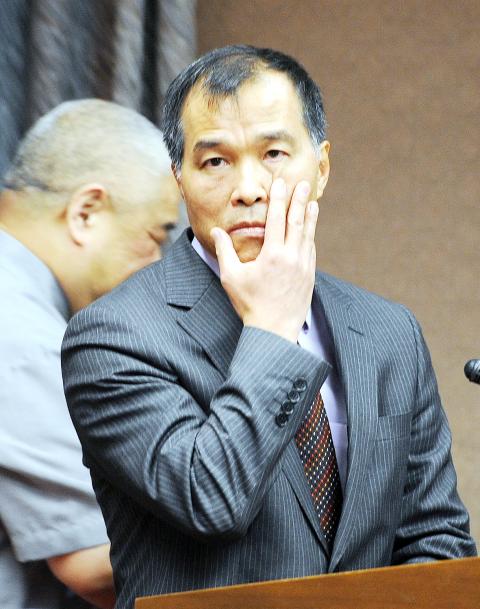Minister of Transportation and Communications Yeh Kuang-shih (葉匡時) was harshly criticized in the Legislative Yuan yesterday for submitting the flight plans of the Taiwanese airlines to Chinese authorities after Beijing unilaterally declared a new air defense identification zone (ADIZ), with lawmakers saying Yeh has no backbone.
The US and Japan have refused to recognize China’s ADIZ, with the former flying two B-52 bombers over disputed islands in the East China Sea and the latter asking its airlines not to send their flight plans to China.
Yeh said China’s ADIZ does not involve trespassing into the nation’s airspace or sovereignty, adding that a line of Taiwan’s ADIZ is very close to Shanghai.

Photo: Lo Pei-der, Taipei Times
“The zone allows a country to know in advance if any unidentified aircraft is approaching to avoid any misunderstanding. It is purely designed from the perspective of air defense. In view of the safety of our civil aviation flights, we will follow the rules of the International Civil Aviation Organization [ICAO] and give our flight plans to China. Likewise, China needs to submit its flight plans to us,” Yeh said.
Singapore and the Philippines have also given the flight plans of their airlines to China, and about a dozen countries have also declared ADIZs, he said.
However, China’s controversial move was unwise because it could easily lead to disputes, he said.
Taiwan would follow the ICAO regulations, he said.
Yeh’s answers failed to appease lawmakers.
Democratic Progressive Party (DPP) Legislator Lee Kun-tse (李昆澤) said China’s new ADIZ covers a large part of East China Sea and was a military expansion.
While the Japanese Ministry of Land, Infrastructure, Transport and Tourism had asked Japanese airlines not to report their flight plans to China, the Ministry of Transportation and Communications had decided to voluntarily comply without a hint of defiance, Lee said.
“The Civil Aeronautics Administration might as well be annulled. We should let China’s Air Traffic Management Bureau do the job,” he said.
DPP Legislator Yeh Yi-jin (葉宜津) said that sovereignty determines the range of an ADIZ and the government’s response has made it appear that Taiwan is acquiescing to China’s requests.
DPP Legislator Tsai Chi-chang (蔡其昌) asked why Japan, South Korea and the US had ignored China’s request if the move did not involve sovereignty issues.
“Do not we have our own strategic considerations for national defense? Have Japan, the US and South Korea failed to the follow ICAO regulations by ignoring China’s request?” Tsai said.
He asked Yeh if the government would follow Tokyo and Seoul’s example.
Yeh said his ministry would abide by the National Security Council’s decision.
“The council will make an overall review in terms of our country’s long-term strategic interests,” Yeh said, adding that the ministry will respect the council’s directive.
However, Tsai said Taiwan’s situation was very different from the one faced by Singapore and the Philippines, and it was unacceptable that the nation did not even dare protest against China’s move.
Additional reporting by CNA

CARROT AND STICK: While unrelenting in its military threats, China attracted nearly 40,000 Taiwanese to over 400 business events last year Nearly 40,000 Taiwanese last year joined industry events in China, such as conferences and trade fairs, supported by the Chinese government, a study showed yesterday, as Beijing ramps up a charm offensive toward Taipei alongside military pressure. China has long taken a carrot-and-stick approach to Taiwan, threatening it with the prospect of military action while reaching out to those it believes are amenable to Beijing’s point of view. Taiwanese security officials are wary of what they see as Beijing’s influence campaigns to sway public opinion after Taipei and Beijing gradually resumed travel links halted by the COVID-19 pandemic, but the scale of

TRADE: A mandatory declaration of origin for manufactured goods bound for the US is to take effect on May 7 to block China from exploiting Taiwan’s trade channels All products manufactured in Taiwan and exported to the US must include a signed declaration of origin starting on May 7, the Bureau of Foreign Trade announced yesterday. US President Donald Trump on April 2 imposed a 32 percent tariff on imports from Taiwan, but one week later announced a 90-day pause on its implementation. However, a universal 10 percent tariff was immediately applied to most imports from around the world. On April 12, the Trump administration further exempted computers, smartphones and semiconductors from the new tariffs. In response, President William Lai’s (賴清德) administration has introduced a series of countermeasures to support affected

Pope Francis is be laid to rest on Saturday after lying in state for three days in St Peter’s Basilica, where the faithful are expected to flock to pay their respects to history’s first Latin American pontiff. The cardinals met yesterday in the Vatican’s synod hall to chart the next steps before a conclave begins to choose Francis’ successor, as condolences poured in from around the world. According to current norms, the conclave must begin between May 5 and 10. The cardinals set the funeral for Saturday at 10am in St Peter’s Square, to be celebrated by the dean of the College

CROSS-STRAIT: The vast majority of Taiwanese support maintaining the ‘status quo,’ while concern is rising about Beijing’s influence operations More than eight out of 10 Taiwanese reject Beijing’s “one country, two systems” framework for cross-strait relations, according to a survey released by the Mainland Affairs Council (MAC) on Thursday. The MAC’s latest quarterly survey found that 84.4 percent of respondents opposed Beijing’s “one country, two systems” formula for handling cross-strait relations — a figure consistent with past polling. Over the past three years, opposition to the framework has remained high, ranging from a low of 83.6 percent in April 2023 to a peak of 89.6 percent in April last year. In the most recent poll, 82.5 percent also rejected China’s